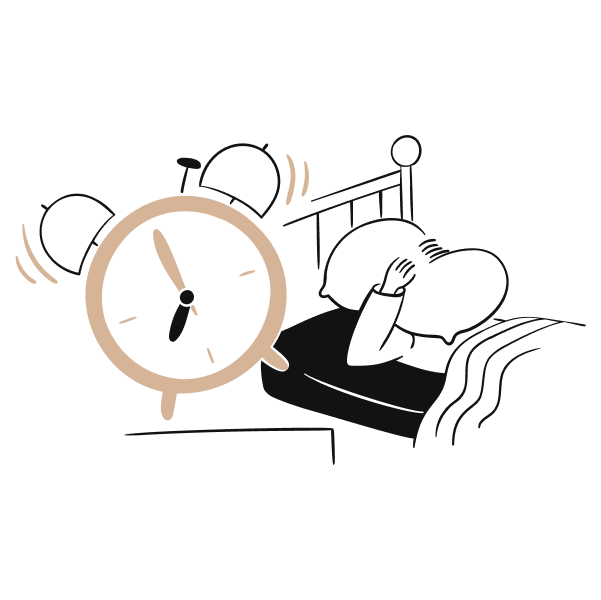Sleep is one of our basic human needs. It is good if you sleep well! Whether you can’t fall asleep, wake up all the time or don’t feel rested: the following sleep advice will help you sleep better. Find out for yourself which advice appeals most to you.
What does “good sleep” mean?
- The amount of sleep you get.
- The quality of sleep – for example, that you sleep well without waking up too much.
- The consistency in your sleep schedule.
Why good sleep is important
Sleep recommendations for better sleep
1. Get exercise
- Moderate exercise every day helps! For example, 10,000 steps every day and 2-3 times a week practicing a sport that you enjoy.
- Exercising in the morning or during the day is by far the best for your sleep. Exercising in the evening creates a lot of energy, which is not good for sleep.
2. Limit caffeine
- Coffee, various teas, soft drinks and chocolate-flavored products; all contain caffeine. In addition to its benefits, caffeine also increases stress, is addictive, increases the likelihood of feelings of anxiety and restlessness and makes adrenaline; the little substance that energizes your body. The best time of day to drink coffee is between 10 am and 1 pm.
- Be sure not to eat three hours before you go to sleep. This gives your body a chance to unwind. Eating right before bed increases the chances of disturbed sleep. Still hungry in the evening? Then eat something easily digestible such as fruit or a bowl of cottage cheese.
3. Avoid alcohol and nicotine
- It sounds tempting, a nightcap to help you fall asleep. Alcohol can make it easier to fall asleep, but it makes your sleep very restless. You wake up more often at night and dry out faster. This does not benefit your sleep.
- Nicotine is an uplifting drug: it makes you alert and sharp. This is exactly what you don’t want for a good night’s sleep.
4. Create a sleep routine
- Fixed time. Consider a set time to get up and go to bed. It doesn’t come down to the minute, but regularity helps.
- Daylight. Start your day with adequate (daytime) light. This helps you stabilize a regular sleep rhythm and make the transition from night to day clear to your body. So, curtains open immediately as soon as the alarm clock rings. Tip: There are also daylight lamps or glasses that help with this.
- Take your time. Make sure you have time in the morning to wake up quietly and prepare for the day so that you start the day from a relaxed position. This way your body is not immediately in a stressed state.
- Always set your alarm clock. Avoid sleeping too long and you will wake up groggy. Of course, sleeping through the night for a party, for example, can’t hurt.
- Turn your alarm clock. That way you won’t see what time it is when you wake up in the middle of the night. Do you wake up a lot during the night? As soon as you see that it’s “only 01:15 a.m.,”brooding thoughts are right around the corner. And when it’s “already 6:05 a.m.,” you get stressed because an hour later the alarm clock is already ringing. The result is that you sleep restlessly and have trouble getting back to sleep.
- Don’t force it. If you still can’t sleep after 15 minutes, get out of bed. Keep tossing and turning until you fall asleep is often counterproductive. Read a few pages from a book, put on some quiet music or make a cup of tea to get creamy. Do get up at your regular time the next morning. If you can’t keep it up, a power nap is an option.
- Take a power nap. Had a bad night? Get some sleep during the day. A power nap of no more than 20 – 30 minutes. Set your alarm as soon as you lie down and make sure you don’t take your power nap after 3 p.m. in the afternoon. This often disrupts your sleep for the evening.
- Breathing & sleep. Before you go to sleep, put a piece of tape on your lips. This contributes to relaxed nasal breathing during the night. The benefit is that you wake up rested and with more energy.
- Tip: Get used to the piece of tape first by testing it during the day.
5. Limit your screen use
- One hour before sleeping, turn off all digital screens. No television, cell phone, tablet, e-reader, unless you can turn off the light. This disrupts melatonin production. Melatonin is a hormone that plays a role in our body’s sleep-wake rhythm. It causes us to become sleepy when it gets dark. Light disrupts this rhythm and makes it harder for you to fall asleep.
6. Relax before bedtime
- Take time during the day for a few short moments of rest. Consider a short breathing exercise or meditation. Just staring in front of you for 5 minutes is also possible, of course. A handy app for a guided meditation, for example, is Headspace.
- An example of a breathing exercise to relax is: breathe in very gently through your nose for 4 seconds. Hold your breath for 7 seconds. Exhale very gently through your mouth for 8 seconds.
- Take a walk around the block before you go to bed or do some yoga exercises that are relaxing for you.
- A cup of chamomile tea or other sleeping tea forms a soothing ritual.
- For some, keeping a journal helps.
7. Write down thoughts
- Set aside 10 minutes to write once or twice a day. Write down all your thoughts and solutions. Really park your thoughts until that moment. This has been proven to help even the biggest doomsayers.
8. Have a tidy bedroom
- Sleep in a dark, cool room. Invest in blackout curtains or put on a sleep mask.
- Is there a lot of ambient noise around you, such as from cars on the street? Then earplugs can be a solution.
- Use your bedroom only for sleeping and sex.
- Keep the room nice and tidy. Watching TV, computing, working or other activities are better to do in another room.
When will I notice results?
Final Tips
- Start with one of the steps that excites you, that makes you feel challenged. A step where you feel like, this is going to be something I can achieve without being too easy to achieve. It’s important to challenge yourself a little bit.
- When you have made the step you have chosen your own, begin the next step.
- Take one small step each day. This may not seem like much at first, but after 30 days you will already see progression without too much effort.
Therapy to sleep better
Help
Do your sleep problems persist despite the above advice? Therapy can help treat your sleep problems.
-
Questions about your sleep hygiene and symptoms? Feel free to get in touch with one of our psychologists or call us at +3185-1308900.
-
iPractice works with Blended care. Once every one to two weeks, you’ll visit an iPractice psychologist on site for a 45-minute consultation. Online support is weekly.
-
Cognitive Behavioural Therapy (CBT) is regularly used to discover if you have thoughts that disrupt your sleep pattern.


 Nederlands
Nederlands




